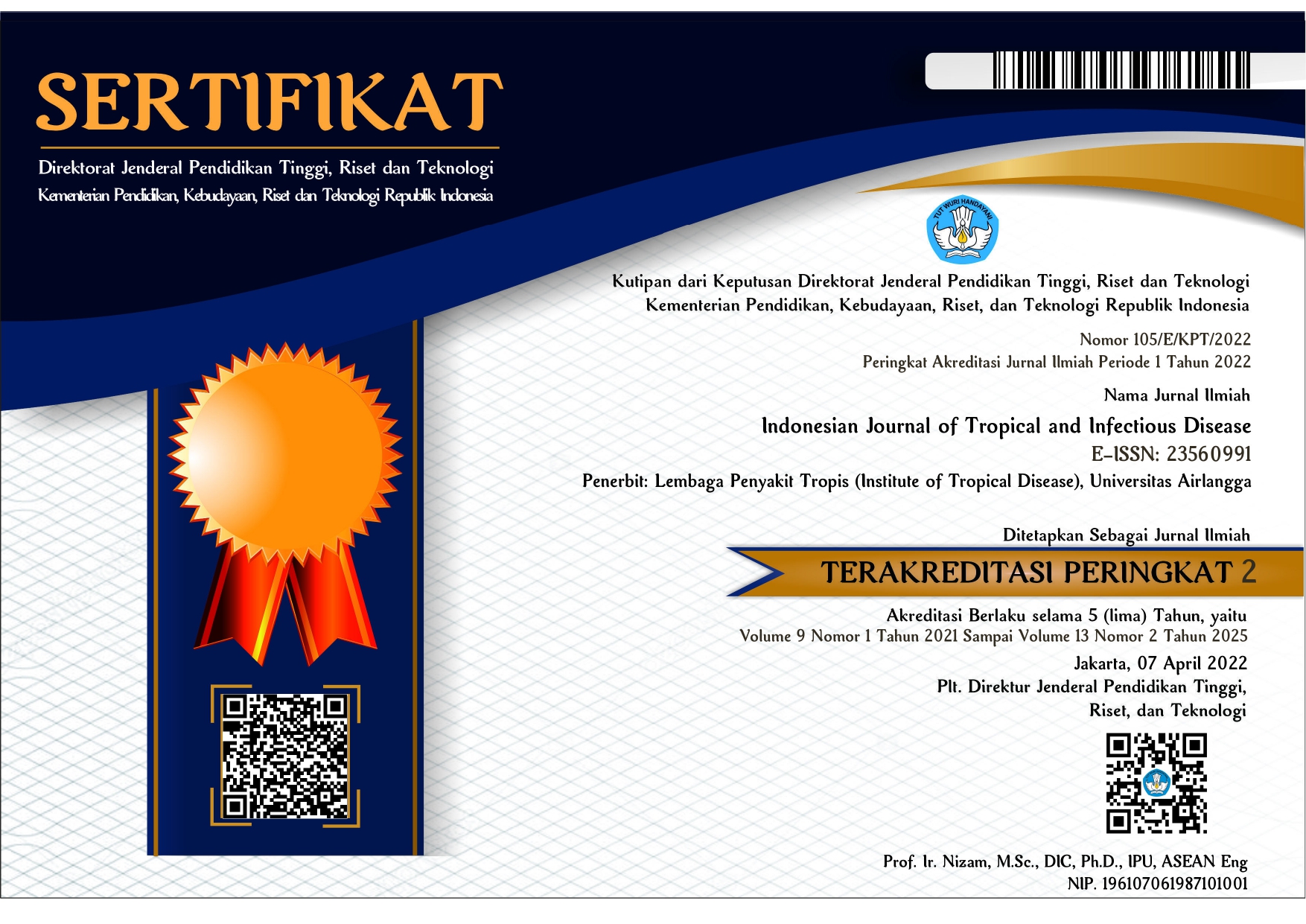An Initiative Report on Hospitalized Pulmonary TB Patients Co-Infected by SARS-CoV-2 during the COVID-19 Pandemic from Tertiary Referral Hospitals in Surabaya
Downloads
The enduring effect of SARS-CoV-2 pandemic has been experienced throughout the past and ongoing three years. Incidences of SARS-CoV-2 co-infected tuberculosis patients were reported globally, including in Italy and several European countries and resulted in a more complicated disease with severe clinical features and poorer clinical outcomes. To effectively manage this co-infection, it is important to be informed of the prevalence and characteristics of an acute SARS-CoV-2 co-infection on TB and determining factors of severity. Therefore, early warning signs can be recognized, monitored closely and managed. This retrospective study, carried out on hospitalized TB patients in Dr. Soetomo Hospital and Universitas Airlangga Hospital, Surabaya, Indonesia, used medical records from March 2020 to December 2022. Samples were from inpatients with a molecularly-Gene Xpert MTB/Rif-confirmed tuberculosis, and currently experienced respiratory and fever symptoms that resembles the symptoms of SARS-CoV-2 infection or exacerbation of tuberculosis. They are then screened and examined using a molecular diagnostic test, with real-time RT-PCR for SARS-CoV-2. A total of 54 (0.7%) patients had TB-SARS-CoV-2 co-infection among 7,786 suspected to have TB, of which 35 had Rifampicin Sensitive (TB-RS), while 19 had TB Rifampicin Resistant (TB-RR) co-infected with SARS-CoV-2. The remaining 2,586 suspected TB patients had only MTB, based on the detection methods of X-pert MTB/RIF, but with negative RT-PCR of SARS-CoV-2. The clinical severity and mortality of TB-SARS-CoV2 co-infected patients were significantly associated with the number of co-morbidities (p=0.0156), and serum haemoglobin levels (p=0.0672), in which p value < 0.05 is considered significant.
Kementerian Dalam Negeri RI. Pedoman Umum Menghadapi Pandemi COVID-19 Bagi Pemerintah Daerah. Jakarta; 2020. https://covid19.kemkes.go.id/protokol-covid-19/pedoman-umum-menghadapi-pandemi-covid-19-bagi-pemerintah-daerah/.
National Institute of Health (NIH). Clinical Spectrum of SARS-CoV-2 Infection. https://www.covid19treatmentguidelines.nih.gov/overview/clinical-spectrum/. Published 2022. Accessed August 1, 2022.
Stochino C, Villa S, Zucchi P, Parravicini P, Gori A, Raviglione MC. Clinical characteristics of COVID-19 and active tuberculosis co-infection in an Italian reference hospital. Eur Respir J. 2020;56(1). doi:10.1183/13993003.01708-2020.
Tadolini M, Codecasa LR, García-García J-M, et al. Active tuberculosis, sequelae and COVID-19 co-infection: first cohort of 49 cases. Eur Respir J. 2020;56(1):2001398. doi:10.1183/13993003.01398-2020.
WHO. Global Tuberculosis Report 2021. Geneva, Switzerland; 2021. https://www.who.int/publications/i/item/9789240037021.
Petrone L, Petruccioli E, Vanini V, et al. Coinfection of tuberculosis and COVID-19 limits the ability to in vitro respond to SARS-CoV-2. Int J Infect Dis. 2021;113(January):S82-S87. doi:10.1016/j.ijid.2021.02.090.
World Health Organization (WHO). Indonesia Commitment to eliminate TB by 2030 supported by the highest level government. https://www.who.int/indonesia/news/detail/28-11-2021-indonesia-commitment-to-eliminate-tb-by-2030-supported-by-the-highest-level-government. Published 2021. Accessed August 29, 2022.
Togun T, Kampmann B, Stoker NG, Lipman M. Anticipating the impact of the COVID-19 pandemic on TB patients and TB control programmes. Ann Clin Microbiol Antimicrob. 2020;19(1):21. doi:10.1186/s12941-020-00363-1.
Peraturan Presiden. LEMBARAN NEGARA REPUBLIK INDONESIA: Penanggulangan TBC. Indonesia; 2021. http://www.peraturan.go.id/peraturan/view.html?id=f724fa6c8f6c0eb70b99a3c24f92db14.
Vabret N, Britton GJ, Gruber C, et al. Immunology of COVID-19: Current State of the Science. Immunity. 2020;52(6):910-941. doi:10.1016/j.immuni.2020.05.002.
Sheerin D, Abhimanyu, Peton N, et al. Immunopathogenic overlap between COVID-19 and tuberculosis identified from transcriptomic meta-analysis and human macrophage infection. iScience. 2022;25(6):104464. doi:10.1016/j.isci.2022.104464.
Magro P, Formenti B, Marchese V, et al. Impact of the SARS-CoV-2 epidemic on tuberculosis treatment outcome in Northern Italy. Eur Respir J. 2020;56(4):2002665. doi:10.1183/13993003.02665-2020.
Marimuthu Y, Nagappa B, Sharma N, Basu S, Chopra KK. COVID-19 and tuberculosis: A mathematical model based forecasting in Delhi, India. Indian J Tuberc. 2020;67(2):177-181. doi:10.1016/j.ijtb.2020.05.006.
Keddy KH, Migliori GB, Van Der Walt M. Developing health policies in patients presenting with SARS-CoV-2: consider tuberculosis. Lancet Glob Heal. 2020;8(11):e1357-e1358. doi:10.1016/S2214-109X(20)30413-7.
Ong CWM, Migliori GB, Raviglione M, et al. Epidemic and pandemic viral infections: impact on tuberculosis and the lung. Eur Respir J. 2020;56(4):2001727. doi:10.1183/13993003.01727-2020.
Hoehl S, Rabenau H, Berger A, et al. Evidence of SARS-CoV-2 Infection in Returning Travelers from Wuhan, China. N Engl J Med. 2020;382(13):1278-1280. doi:10.1056/NEJMc2001899.
Feng S, Song F, Guo W, et al. Potential Genes Associated with COVID-19 and Comorbidity. Int J Med Sci. 2022;19(2):402-415. doi:10.7150/ijms.67815.
Zóka A, BekÅ‘ G. Does the E gene provide additional information in SARS-CoV-2 PCR? J Infect Chemother. 2021;27(11):1676-1677. doi:10.1016/j.jiac.2021.08.017.
Ponti G, Pastorino L, Manfredini M, et al. COVID"19 spreading across world correlates with C677T allele of the methylenetetrahydrofolate reductase (MTHFR) gene prevalence. J Clin Lab Anal. 2021;35(7):1-7. doi:10.1002/jcla.23798.
Binnicker MJ. Can Testing Predict SARS-CoV-2 Infectivity? The Potential for Certain Methods To Be Surrogates for Replication-Competent Virus. Humphries RM, ed. J Clin Microbiol. 2021;59(11):e0046921. doi:10.1128/JCM.00469-21.
Fenaux H, Ghelfenstein-Ferreira T, Salmona M, et al. Interpretation of single target positivity among SARS-CoV-2 RT-PCR result tests. J Clin Virol Plus. 2021;1(1-2):100021. doi:10.1016/j.jcvp.2021.100021.
Corman VM, Landt O, Kaiser M, et al. Detection of 2019 novel coronavirus (2019-nCoV) by real-time RT-PCR. Eurosurveillance. 2020;25(3). doi:10.2807/1560-7917.ES.2020.25.3.2000045.
Pandey O, Paudyal B, Basnyat B. Gene-Xpert: Diagnosis of Pulmonary Tuberculosis in a Sputum Smear Negative Patient. J Nepal Health Res Counc. 2019;17(1):125-127. doi:10.33314/jnhrc.2013.
Vanaerschot M, Mann SA, Webber JT, et al. Identification of a Polymorphism in the N Gene of SARS-CoV-2 That Adversely Impacts Detection by Reverse Transcription-PCR. Caliendo AM, ed. J Clin Microbiol. 2020;59(1):1-4. doi:10.1128/JCM.02369-20.
Dewi DNSS, Mertaniasih NM, Soedarsono. Severity of TB Classified by modified BANDIM Scoring associates with the specific sequence of ESXA genes in MDR-TB patients. African J Infect Dis. 2020;14(1):8-15. doi:10.21010/ajid.v14i1.2.
Rudolf F, Joaquim LC, Vieira C, et al. The Bandim tuberculosis score: reliability and comparison with the Karnofsky performance score. Scand J Infect Dis. 2013;45(4):256-264. doi:10.3109/00365548.2012.731077.
Sheerin D, Abhimanyu, Wang X, Johnson WE, Coussens A. Systematic evaluation of transcriptomic disease risk and diagnostic biomarker overlap between COVID-19 and tuberculosis: a patient-level meta-analysis. medRxiv Prepr Serv Heal Sci. November 2020. doi:10.1101/2020.11.25.20236646.
Loo J, Spittle DA, Newnham M. COVID-19, immunothrombosis and venous thromboembolism: biological mechanisms. Thorax. 2021;76(4):412-420. doi:10.1136/thoraxjnl-2020-216243.
Crisan-Dabija R, Grigorescu C, Pavel C-A, et al. Tuberculosis and COVID-19: Lessons from the Past Viral Outbreaks and Possible Future Outcomes. Can Respir J. 2020;2020:1-10. doi:10.1155/2020/1401053.
Syafa'ah I, Yudhawati R. Peran Imunitas Mukosa terhadap Infeksi Mycobacterium Tuberculosis. J Respirasi. 2019;2(2):61. doi:10.20473/jr.v2-I.2.2016.61-68.
Hu B, Guo H, Zhou P, Shi Z-L. Characteristics of SARS-CoV-2 and COVID-19. Nat Rev Microbiol. 2021;19(3):141-154. doi:10.1038/s41579-020-00459-7.
Zhang L, Guo H. Biomarkers of COVID-19 and technologies to combat SARS-CoV-2. Adv Biomark Sci Technol. 2020;2(January):1-23. doi:10.1016/j.abst.2020.08.001.
Kant S, Tyagi R. The impact of COVID-19 on tuberculosis: challenges and opportunities. Ther Adv Infect Dis. 2021;8:204993612110169. doi:10.1177/20499361211016973.
Luke E, Swafford K, Shirazi G, Venketaraman V. TB and COVID-19: An Exploration of the Characteristics and Resulting Complications of Co-infection. Front Biosci. 2022;14(1):6. doi:10.31083/j.fbs1401006.
Zuin, M.; Rigatelli, G.; Quadretti, L.; Fogato, L.; Zuliani, G.; Roncon, L. Prognostic Role of Anemia in COVID-19 Patients: A Meta-Analysis. Infect. Dis. Rep. 2021, 13, 930-937. https://doi.org/10.3390/idr13040085
Al-Jarallah, M.; Rajan, R.; Al Saber, A.; Pan, J.; Al-Sultan, A.T.; Abdelnaby, H.; Alroomi, M.; Dashti, R.; Aboelhassan, W.; Almutairi, F.; et al. In-hospital mortality in SARS-CoV-2 stratified by hemoglobin levels: A retrospective study. eJHaem 2021, 2, 335–339.
Copyright (c) 2023 Indonesian Journal of Tropical and Infectious Disease

This work is licensed under a Creative Commons Attribution-NonCommercial-ShareAlike 4.0 International License.
The Indonesian Journal of Tropical and Infectious Disease (IJTID) is a scientific peer-reviewed journal freely available to be accessed, downloaded, and used for research. All articles published in the IJTID are licensed under the Creative Commons Attribution-NonCommercial-ShareAlike 4.0 International License, which is under the following terms:
Attribution ” You must give appropriate credit, link to the license, and indicate if changes were made. You may do so reasonably, but not in any way that suggests the licensor endorses you or your use.
NonCommercial ” You may not use the material for commercial purposes.
ShareAlike ” If you remix, transform, or build upon the material, you must distribute your contributions under the same license as the original.
No additional restrictions ” You may not apply legal terms or technological measures that legally restrict others from doing anything the license permits.























